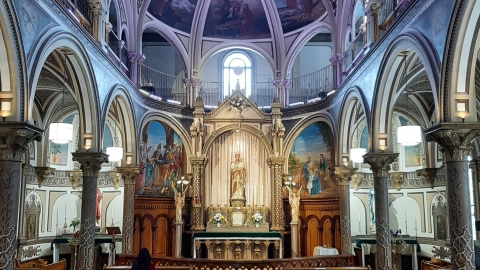The Reform of the Curia, the Dragon of the Papacy (3)
In an interview given to Passauer neue Presse on May 6, 2019, Cardinal Müller panned the project to reorganize the Curia which is spreading through the Vatican. He had already lashed out against this reform in l’Osservatore Romano on February 8, 2015, when he published a hit piece under the title, “Theological Criteria for a Reform of the Church and the Roman Curia” (cf. part 2).
The result the cardinal had hoped to see was achieved: the consistory ended, and, as we learned, the discussion of the project was postponed sine die...The former prefect of the Congregation for the Doctrine of the Faith comes back to the attack through this interview. And he is even more critical.
The Absence of Theological Foundations
The tone is quickly established: Cardinal Müller accuses the schema of not presenting a definition acceptable to the Church of its nature or of its mission…and of not taking a Vatican II point of view. This is “an assemblage of individual, subjective ideas, of pious desires, of moral appeals, stuffed with citations to Council texts and declarations of the present pope.” This is why, he adds, “the Curia remains in a sort of state of suspension, because it is no longer clearly oriented towards serving the pope for the universal Church.”
The essential objection is that “there is no clear distinction between lay institutions of the Vatican as a sovereign state, the Holy See as the subject of international law, and the purely ecclesiastical justification of the primacy of the pope, as the Bishop of Rome in the succession of the apostle Peter.” This confusion leads to dire consequences.
A Discretionary Transformation
The former Prefect for the Congregation for the Doctrine of the Faith recalls that, “the Church…cannot be transformed arbitrarily like a country or an organization created by man,” because she “is founded on the Catholic Faith in Christ and on her essential institutions of apostolic origin.” He goes on to complain that, “the fatal error of the reform of the Curia committed by Paul VI, placing the Secretary of State at the hear of the Curia, will be increased.”
He concludes in saying that, “the current project oscillates between a spiritualization of attitudes required of all the employees of the Curia (“missionary conversion”) and a secular conception of the Church, which must be run as an international enterprise—as if it were a case of a balance of power between a home office and its branches, and a stronger role for local agencies.” One can recognize there an already condemned danger, affirming that one could not introduce it either to the Synod of Bishops nor to the Episcopal Conferences within the Curia.
An Inversion of Ends…
“The highest mission of the pope is his teaching as a member of and head of the college of bishops. The secular duties are secondary: they have no essential connection to the papacy and sometimes have hidden its true mission throughout history. To place these secular tasks over the spiritual mission today is a mistake that must be avoided,” he explains quite justly, even if the pope says that he is “member and head”—which is pleonastic—of the college, which comes from the novelty of collegiality promulgated at the Council. From this inversion naturally flows disorder. According to Cardinal Müller, “there is no longer a supreme dicastery, because all dicasteries are equal. The project is a disjointed succession of 16 ministries who are in some sort of service to the pope, the individual bishops, and the bishops’ conferences, e.g., the Apostolic Chaplaincy precedes the liturgy and the sacraments, which are essential elements of the Church!”
…and a Priority of Action over the Faith
For, the cardinal continues, the Dicastery for Evangelization is the first named “even though it is a task of the Universal Church and not a specific task of the pope.” Which seems illogical to him—can there be evangelization without content and without proclamation of the Faith? “Although the universal teaching of the Church is the reason for the existence of papal primacy, in the present project, the doctrine of the Faith only appears as a random task of the pope, and above all, subordinate to his temporal obligations.”
The Devaluation or Overvaluation of the Episcopal Function
He finally recalls, although in a clumsy and incomplete way, the monarchical and aristocratic structure of the Church. “The episcopate,” he says, “can neither be improved nor devalued by Rome because the bishops are the anointed of Christ and act with their own apostolic authority, and not as local representatives of the pope. He is only a bishop like all the others, although he has a special mandate to ensure the unity of the Church in the Faith, in the communion of the sacraments, and in the constitution of the universal Church.”
The Reason for this Theological Poverty is the Ignorance of the Editors
He especially points out that, “the basic concepts of Catholic theology, i.e., Revelation, the Gospels, the Scriptures, apostolic tradition, or the ecclesiastical Magisterium, are used incorrectly or in a biased manner. There is no distinction between revealed doctrine and academic teaching. Synodality is evoked and the term is used as a magic word. Nevertheless, the congregations are abolished and replaced by the functional concept of the dicastery. The Congregation is only the Latin equivalent of Synod and testifies to the internal collegiality of the papacy, insofar as the pope solicits advice and support from the Assembly of the Roman Church, whether in the general consistory of cardinals or in their partial assembly in the Congregation—in the framework of his Petrine ministry.”
And to conclude, “we must hope that this section [of the project] will be completely reformulated by an experienced theologian and canonist.”
The Key to the Proposed Reform
In his latest reply, Cardinal Müller provides an explanatory principle of the reform project: “the strengthening of the periphery and the reduction of centralism, points to an alleged claim to sovereignty.” But he contests it strongly, “Rome is certainly not the center of the Church, and...the local Churches are not on the periphery either. The center of the Church is Christ, and wherever the Eucharist is celebrated, it is fully present. The pope in his functions is only the principle and the foundation of the unity of the Church, visible in the Creed, and in the worship of God in the sacraments. The local priest is more important to the faithful than the pope, because he proclaims the gospel here and now; he gives the sacraments; and, as a pastor, he leads people to Christ.”
This interview allows the drawing out of the main lines of the project to reform the Curia, and it has the merit of giving certain answers. However, it shows the limits of Cardinal Müller’s theology, himself a tributary of the Second Vatican Council. Most importantly, two points should be raised.
1) His restrictive way of considering the pontifical function depends on collegiality as conceived in the Council. This prevents him from giving a clear answer to the real dilution of powers that this reform anticipates.
2) An “existentialist” conception of the Church where the local priest is more important to the faithful than the pope—which does not allow an exit from the horizontal schema imposed by Francis (center and periphery). The importance of the priestly apostolate to souls can be emphasized only at a practical level. But the Vicar of Christ, even though he does not stand in for any members of the clergy, animates each and every one of them from the power he has received from Christ as supreme pastor.
Henceforth, a crucial question arises: if Pope Francis achieves his ends, what will remain of the divine constitution of the Church?
(Source : FSSPX - FSSPX.Actualités – 05/15/2019)



